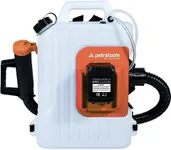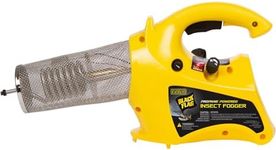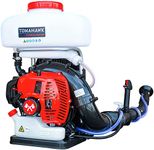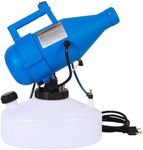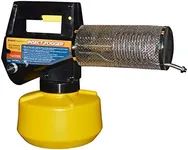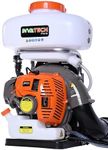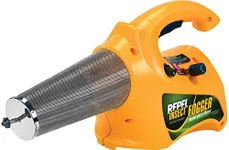Buying Guide for the Best Mosquito Fogger Machines
Choosing the right mosquito fogger machine can make a significant difference in effectively controlling mosquito populations around your home or property. To make an informed decision, it's important to understand the key specifications and how they relate to your specific needs. Here are the main factors to consider when selecting a mosquito fogger machine.Type of FoggerMosquito foggers come in two main types: thermal foggers and cold (ULV) foggers. Thermal foggers use heat to vaporize the fogging solution, creating a dense fog that can penetrate deep into foliage and other hiding spots. They are ideal for outdoor use and large areas. Cold foggers, on the other hand, use air pressure to create a fine mist and are suitable for both indoor and outdoor use. They are often preferred for smaller areas or when a less dense fog is needed. Choose a thermal fogger if you need to cover a large outdoor area, and a cold fogger if you need versatility for both indoor and outdoor applications.
Power SourceMosquito foggers can be powered by electricity, propane, or batteries. Electric foggers are typically lightweight and easy to use, but they require access to an electrical outlet, which can limit their portability. Propane foggers are more portable and can be used in remote areas without electricity, but they require propane tanks, which can add to the cost and maintenance. Battery-powered foggers offer the convenience of portability without the need for propane, but they may have limited runtime depending on the battery capacity. Consider where you will be using the fogger and choose a power source that best fits your needs.
Fogging CapacityThe fogging capacity refers to the amount of area a fogger can cover in a single session. This is usually measured in square feet or acres. A higher fogging capacity means the machine can cover a larger area more quickly, which is important for large properties or severe mosquito infestations. For smaller yards or less severe infestations, a fogger with a lower capacity may be sufficient. Assess the size of the area you need to treat and choose a fogger with an appropriate capacity to ensure effective coverage.
Droplet SizeDroplet size is a critical factor in the effectiveness of a mosquito fogger. Smaller droplets (measured in microns) can stay airborne longer and penetrate deeper into foliage, making them more effective at reaching hidden mosquitoes. Thermal foggers typically produce smaller droplets, while cold foggers can produce a range of droplet sizes. For outdoor use and dense vegetation, a fogger that produces smaller droplets is ideal. For indoor use or areas with less vegetation, a fogger with larger droplets may be sufficient. Consider the environment you will be treating and choose a fogger with an appropriate droplet size.
Ease of UseEase of use encompasses factors such as the weight of the fogger, the complexity of operation, and the maintenance required. Lightweight foggers are easier to handle and maneuver, especially for extended periods. Simple operation is important for those who are not familiar with using fogging equipment, and low-maintenance models can save time and effort in the long run. If you are new to using foggers or prefer a hassle-free experience, look for a model that is user-friendly and requires minimal maintenance.
Safety FeaturesSafety features are crucial when dealing with chemicals and fogging equipment. Look for foggers with features such as automatic shut-off, safety locks, and protective shields to prevent accidental exposure to the fogging solution. Additionally, consider models with clear instructions and safety guidelines to ensure proper use. If you have children or pets, safety features become even more important. Prioritize foggers with robust safety features to protect yourself and others while using the machine.
